Ethics in Business: Tesco's Vision, Leadership, Management and Culture
VerifiedAdded on 2021/02/22
|9
|2621
|49
Report
AI Summary
This report provides an in-depth analysis of business ethics within Tesco plc, a leading multinational retail organization. The introduction establishes the importance of business ethics, emphasizing the significance of ethical practices in areas such as corporate governance and stakeholder relations. The main body explores Tesco's vision, leadership styles (particularly democratic leadership), and management practices, including training and development, performance evaluation, and reward systems. The report also examines Tesco's organizational culture using Handy's Model, which includes power, task, person, and role cultures. Furthermore, the report discusses various management styles and their influence on business functions and strategies, such as autocratic, democratic, operational, laissez-faire, charismatic, and transactional styles. The conclusion synthesizes the findings, highlighting the importance of ethical decision-making and effective management practices in fostering organizational success. The report provides a comprehensive overview of Tesco's approach to business ethics and its impact on the company's operations and culture.
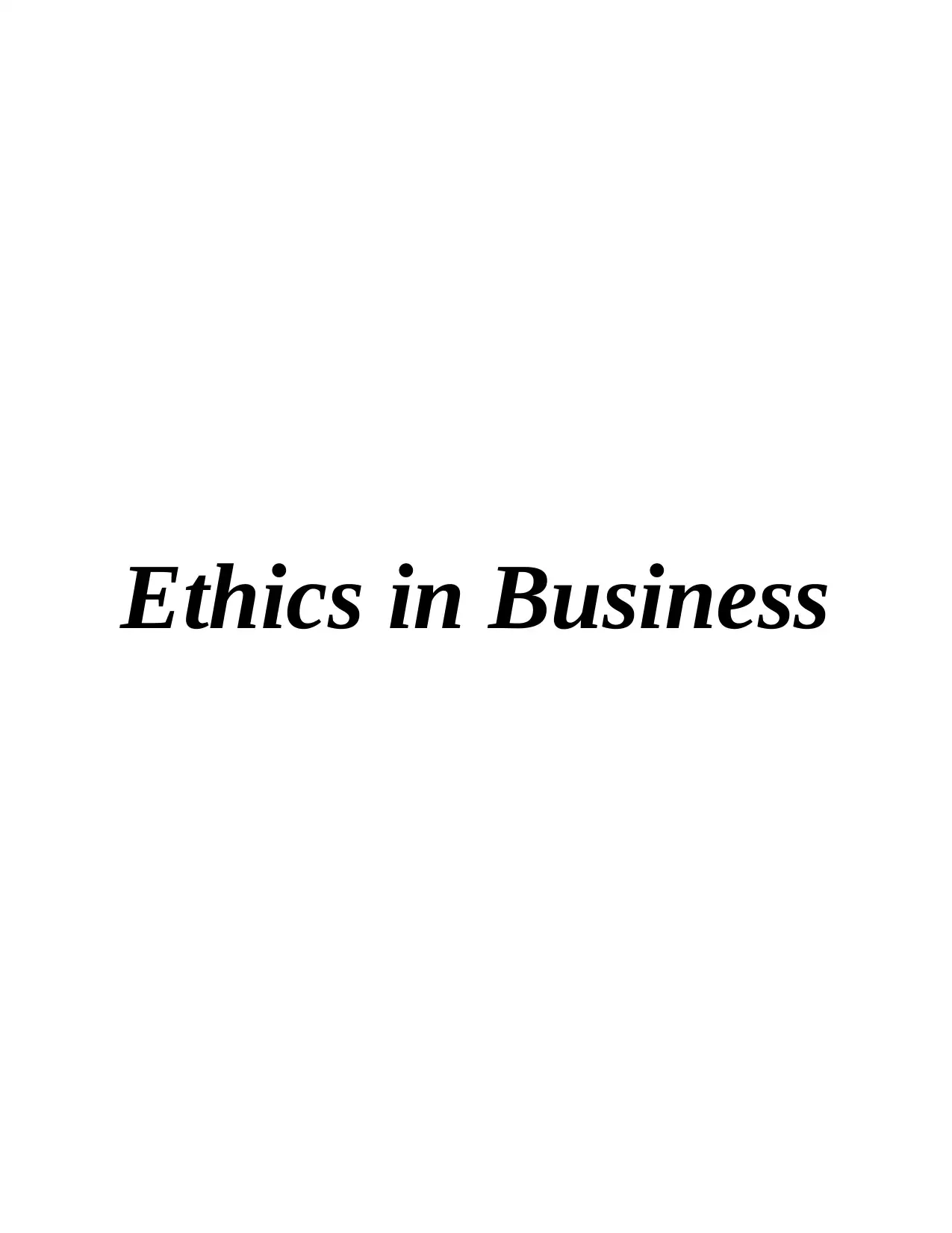
Ethics in Business
Paraphrase This Document
Need a fresh take? Get an instant paraphrase of this document with our AI Paraphraser
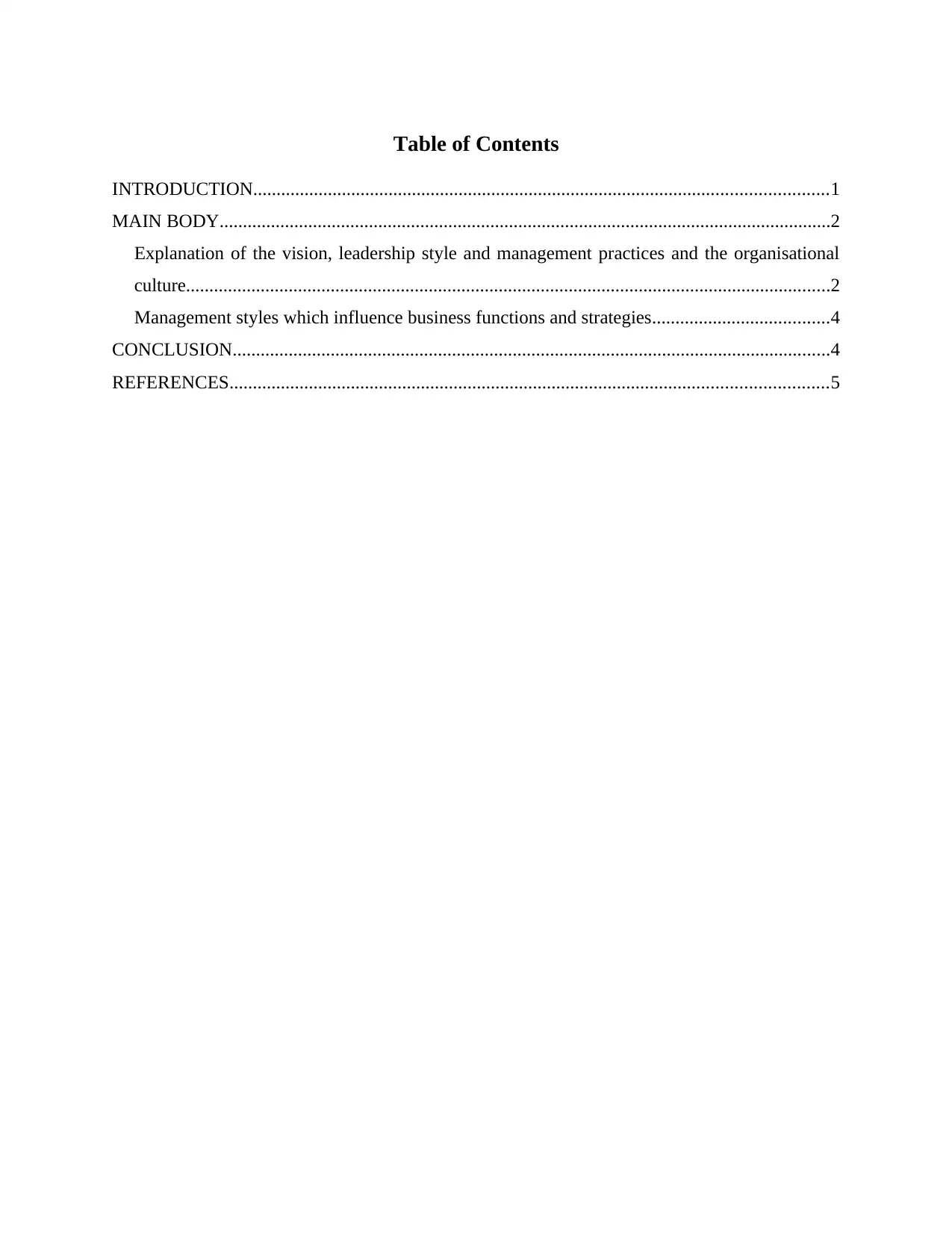
Table of Contents
INTRODUCTION...........................................................................................................................1
MAIN BODY...................................................................................................................................2
Explanation of the vision, leadership style and management practices and the organisational
culture..........................................................................................................................................2
Management styles which influence business functions and strategies......................................4
CONCLUSION................................................................................................................................4
REFERENCES................................................................................................................................5
INTRODUCTION...........................................................................................................................1
MAIN BODY...................................................................................................................................2
Explanation of the vision, leadership style and management practices and the organisational
culture..........................................................................................................................................2
Management styles which influence business functions and strategies......................................4
CONCLUSION................................................................................................................................4
REFERENCES................................................................................................................................5
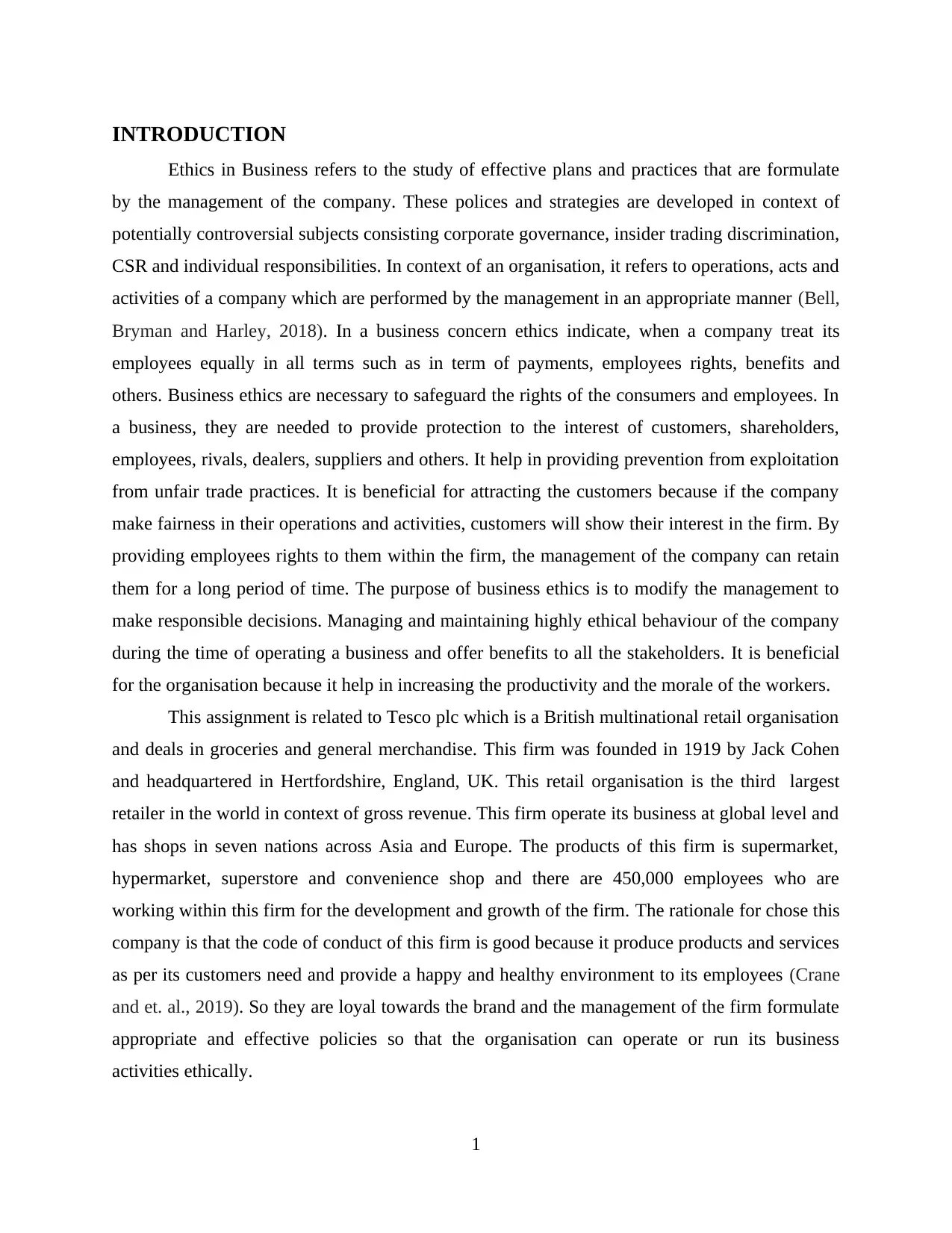
INTRODUCTION
Ethics in Business refers to the study of effective plans and practices that are formulate
by the management of the company. These polices and strategies are developed in context of
potentially controversial subjects consisting corporate governance, insider trading discrimination,
CSR and individual responsibilities. In context of an organisation, it refers to operations, acts and
activities of a company which are performed by the management in an appropriate manner (Bell,
Bryman and Harley, 2018). In a business concern ethics indicate, when a company treat its
employees equally in all terms such as in term of payments, employees rights, benefits and
others. Business ethics are necessary to safeguard the rights of the consumers and employees. In
a business, they are needed to provide protection to the interest of customers, shareholders,
employees, rivals, dealers, suppliers and others. It help in providing prevention from exploitation
from unfair trade practices. It is beneficial for attracting the customers because if the company
make fairness in their operations and activities, customers will show their interest in the firm. By
providing employees rights to them within the firm, the management of the company can retain
them for a long period of time. The purpose of business ethics is to modify the management to
make responsible decisions. Managing and maintaining highly ethical behaviour of the company
during the time of operating a business and offer benefits to all the stakeholders. It is beneficial
for the organisation because it help in increasing the productivity and the morale of the workers.
This assignment is related to Tesco plc which is a British multinational retail organisation
and deals in groceries and general merchandise. This firm was founded in 1919 by Jack Cohen
and headquartered in Hertfordshire, England, UK. This retail organisation is the third largest
retailer in the world in context of gross revenue. This firm operate its business at global level and
has shops in seven nations across Asia and Europe. The products of this firm is supermarket,
hypermarket, superstore and convenience shop and there are 450,000 employees who are
working within this firm for the development and growth of the firm. The rationale for chose this
company is that the code of conduct of this firm is good because it produce products and services
as per its customers need and provide a happy and healthy environment to its employees (Crane
and et. al., 2019). So they are loyal towards the brand and the management of the firm formulate
appropriate and effective policies so that the organisation can operate or run its business
activities ethically.
1
Ethics in Business refers to the study of effective plans and practices that are formulate
by the management of the company. These polices and strategies are developed in context of
potentially controversial subjects consisting corporate governance, insider trading discrimination,
CSR and individual responsibilities. In context of an organisation, it refers to operations, acts and
activities of a company which are performed by the management in an appropriate manner (Bell,
Bryman and Harley, 2018). In a business concern ethics indicate, when a company treat its
employees equally in all terms such as in term of payments, employees rights, benefits and
others. Business ethics are necessary to safeguard the rights of the consumers and employees. In
a business, they are needed to provide protection to the interest of customers, shareholders,
employees, rivals, dealers, suppliers and others. It help in providing prevention from exploitation
from unfair trade practices. It is beneficial for attracting the customers because if the company
make fairness in their operations and activities, customers will show their interest in the firm. By
providing employees rights to them within the firm, the management of the company can retain
them for a long period of time. The purpose of business ethics is to modify the management to
make responsible decisions. Managing and maintaining highly ethical behaviour of the company
during the time of operating a business and offer benefits to all the stakeholders. It is beneficial
for the organisation because it help in increasing the productivity and the morale of the workers.
This assignment is related to Tesco plc which is a British multinational retail organisation
and deals in groceries and general merchandise. This firm was founded in 1919 by Jack Cohen
and headquartered in Hertfordshire, England, UK. This retail organisation is the third largest
retailer in the world in context of gross revenue. This firm operate its business at global level and
has shops in seven nations across Asia and Europe. The products of this firm is supermarket,
hypermarket, superstore and convenience shop and there are 450,000 employees who are
working within this firm for the development and growth of the firm. The rationale for chose this
company is that the code of conduct of this firm is good because it produce products and services
as per its customers need and provide a happy and healthy environment to its employees (Crane
and et. al., 2019). So they are loyal towards the brand and the management of the firm formulate
appropriate and effective policies so that the organisation can operate or run its business
activities ethically.
1
⊘ This is a preview!⊘
Do you want full access?
Subscribe today to unlock all pages.

Trusted by 1+ million students worldwide
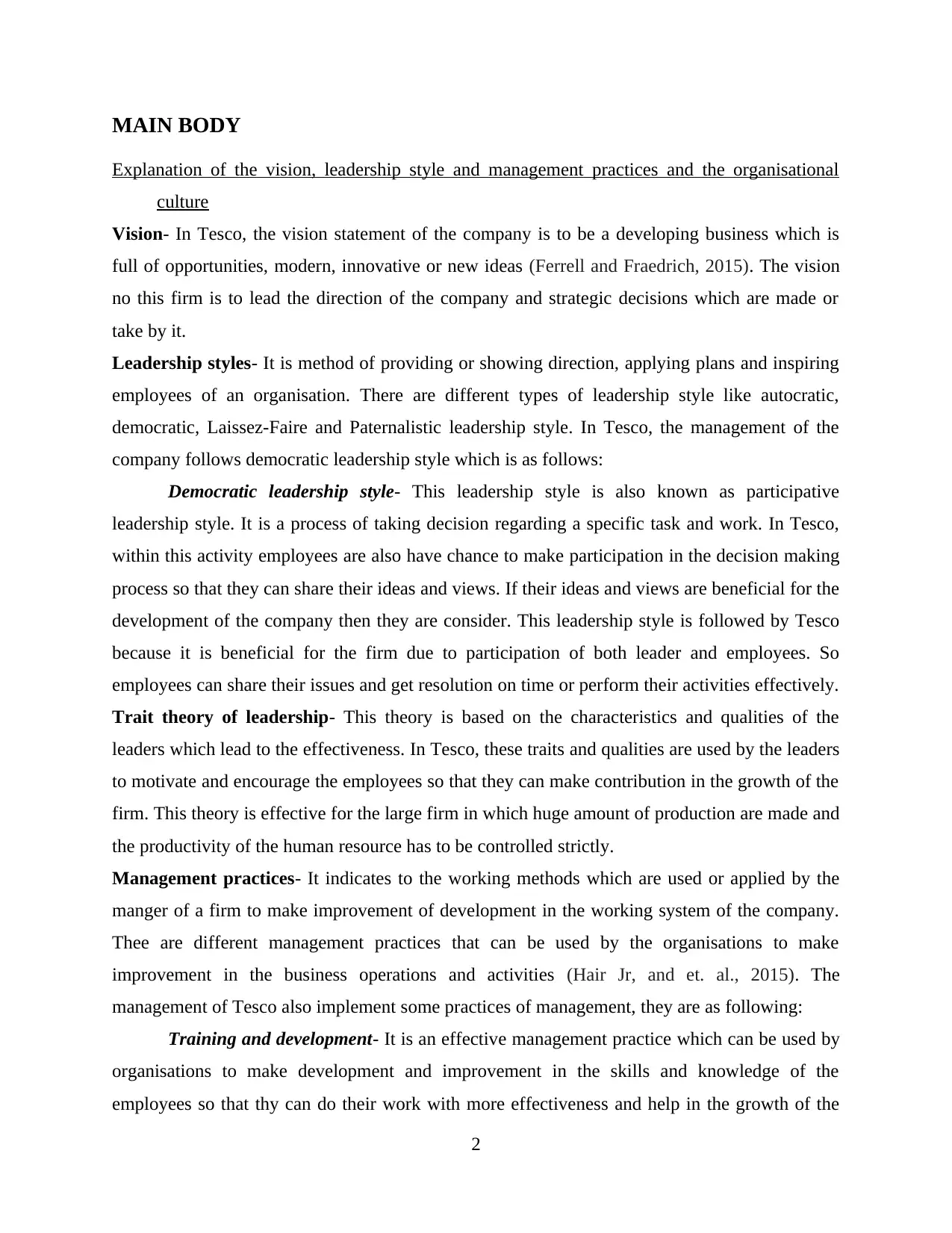
MAIN BODY
Explanation of the vision, leadership style and management practices and the organisational
culture
Vision- In Tesco, the vision statement of the company is to be a developing business which is
full of opportunities, modern, innovative or new ideas (Ferrell and Fraedrich, 2015). The vision
no this firm is to lead the direction of the company and strategic decisions which are made or
take by it.
Leadership styles- It is method of providing or showing direction, applying plans and inspiring
employees of an organisation. There are different types of leadership style like autocratic,
democratic, Laissez-Faire and Paternalistic leadership style. In Tesco, the management of the
company follows democratic leadership style which is as follows:
Democratic leadership style- This leadership style is also known as participative
leadership style. It is a process of taking decision regarding a specific task and work. In Tesco,
within this activity employees are also have chance to make participation in the decision making
process so that they can share their ideas and views. If their ideas and views are beneficial for the
development of the company then they are consider. This leadership style is followed by Tesco
because it is beneficial for the firm due to participation of both leader and employees. So
employees can share their issues and get resolution on time or perform their activities effectively.
Trait theory of leadership- This theory is based on the characteristics and qualities of the
leaders which lead to the effectiveness. In Tesco, these traits and qualities are used by the leaders
to motivate and encourage the employees so that they can make contribution in the growth of the
firm. This theory is effective for the large firm in which huge amount of production are made and
the productivity of the human resource has to be controlled strictly.
Management practices- It indicates to the working methods which are used or applied by the
manger of a firm to make improvement of development in the working system of the company.
Thee are different management practices that can be used by the organisations to make
improvement in the business operations and activities (Hair Jr, and et. al., 2015). The
management of Tesco also implement some practices of management, they are as following:
Training and development- It is an effective management practice which can be used by
organisations to make development and improvement in the skills and knowledge of the
employees so that thy can do their work with more effectiveness and help in the growth of the
2
Explanation of the vision, leadership style and management practices and the organisational
culture
Vision- In Tesco, the vision statement of the company is to be a developing business which is
full of opportunities, modern, innovative or new ideas (Ferrell and Fraedrich, 2015). The vision
no this firm is to lead the direction of the company and strategic decisions which are made or
take by it.
Leadership styles- It is method of providing or showing direction, applying plans and inspiring
employees of an organisation. There are different types of leadership style like autocratic,
democratic, Laissez-Faire and Paternalistic leadership style. In Tesco, the management of the
company follows democratic leadership style which is as follows:
Democratic leadership style- This leadership style is also known as participative
leadership style. It is a process of taking decision regarding a specific task and work. In Tesco,
within this activity employees are also have chance to make participation in the decision making
process so that they can share their ideas and views. If their ideas and views are beneficial for the
development of the company then they are consider. This leadership style is followed by Tesco
because it is beneficial for the firm due to participation of both leader and employees. So
employees can share their issues and get resolution on time or perform their activities effectively.
Trait theory of leadership- This theory is based on the characteristics and qualities of the
leaders which lead to the effectiveness. In Tesco, these traits and qualities are used by the leaders
to motivate and encourage the employees so that they can make contribution in the growth of the
firm. This theory is effective for the large firm in which huge amount of production are made and
the productivity of the human resource has to be controlled strictly.
Management practices- It indicates to the working methods which are used or applied by the
manger of a firm to make improvement of development in the working system of the company.
Thee are different management practices that can be used by the organisations to make
improvement in the business operations and activities (Hair Jr, and et. al., 2015). The
management of Tesco also implement some practices of management, they are as following:
Training and development- It is an effective management practice which can be used by
organisations to make development and improvement in the skills and knowledge of the
employees so that thy can do their work with more effectiveness and help in the growth of the
2
Paraphrase This Document
Need a fresh take? Get an instant paraphrase of this document with our AI Paraphraser
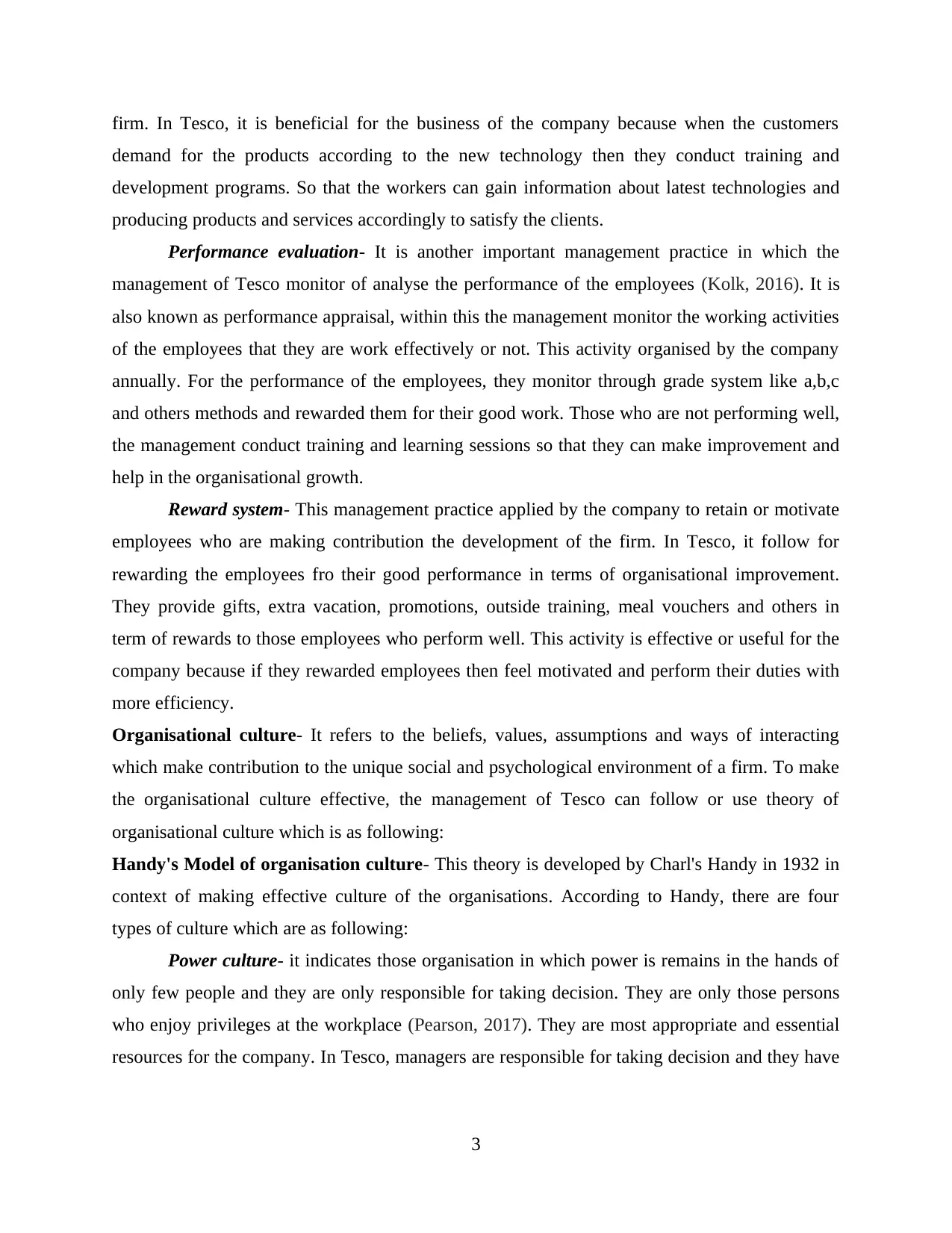
firm. In Tesco, it is beneficial for the business of the company because when the customers
demand for the products according to the new technology then they conduct training and
development programs. So that the workers can gain information about latest technologies and
producing products and services accordingly to satisfy the clients.
Performance evaluation- It is another important management practice in which the
management of Tesco monitor of analyse the performance of the employees (Kolk, 2016). It is
also known as performance appraisal, within this the management monitor the working activities
of the employees that they are work effectively or not. This activity organised by the company
annually. For the performance of the employees, they monitor through grade system like a,b,c
and others methods and rewarded them for their good work. Those who are not performing well,
the management conduct training and learning sessions so that they can make improvement and
help in the organisational growth.
Reward system- This management practice applied by the company to retain or motivate
employees who are making contribution the development of the firm. In Tesco, it follow for
rewarding the employees fro their good performance in terms of organisational improvement.
They provide gifts, extra vacation, promotions, outside training, meal vouchers and others in
term of rewards to those employees who perform well. This activity is effective or useful for the
company because if they rewarded employees then feel motivated and perform their duties with
more efficiency.
Organisational culture- It refers to the beliefs, values, assumptions and ways of interacting
which make contribution to the unique social and psychological environment of a firm. To make
the organisational culture effective, the management of Tesco can follow or use theory of
organisational culture which is as following:
Handy's Model of organisation culture- This theory is developed by Charl's Handy in 1932 in
context of making effective culture of the organisations. According to Handy, there are four
types of culture which are as following:
Power culture- it indicates those organisation in which power is remains in the hands of
only few people and they are only responsible for taking decision. They are only those persons
who enjoy privileges at the workplace (Pearson, 2017). They are most appropriate and essential
resources for the company. In Tesco, managers are responsible for taking decision and they have
3
demand for the products according to the new technology then they conduct training and
development programs. So that the workers can gain information about latest technologies and
producing products and services accordingly to satisfy the clients.
Performance evaluation- It is another important management practice in which the
management of Tesco monitor of analyse the performance of the employees (Kolk, 2016). It is
also known as performance appraisal, within this the management monitor the working activities
of the employees that they are work effectively or not. This activity organised by the company
annually. For the performance of the employees, they monitor through grade system like a,b,c
and others methods and rewarded them for their good work. Those who are not performing well,
the management conduct training and learning sessions so that they can make improvement and
help in the organisational growth.
Reward system- This management practice applied by the company to retain or motivate
employees who are making contribution the development of the firm. In Tesco, it follow for
rewarding the employees fro their good performance in terms of organisational improvement.
They provide gifts, extra vacation, promotions, outside training, meal vouchers and others in
term of rewards to those employees who perform well. This activity is effective or useful for the
company because if they rewarded employees then feel motivated and perform their duties with
more efficiency.
Organisational culture- It refers to the beliefs, values, assumptions and ways of interacting
which make contribution to the unique social and psychological environment of a firm. To make
the organisational culture effective, the management of Tesco can follow or use theory of
organisational culture which is as following:
Handy's Model of organisation culture- This theory is developed by Charl's Handy in 1932 in
context of making effective culture of the organisations. According to Handy, there are four
types of culture which are as following:
Power culture- it indicates those organisation in which power is remains in the hands of
only few people and they are only responsible for taking decision. They are only those persons
who enjoy privileges at the workplace (Pearson, 2017). They are most appropriate and essential
resources for the company. In Tesco, managers are responsible for taking decision and they have
3
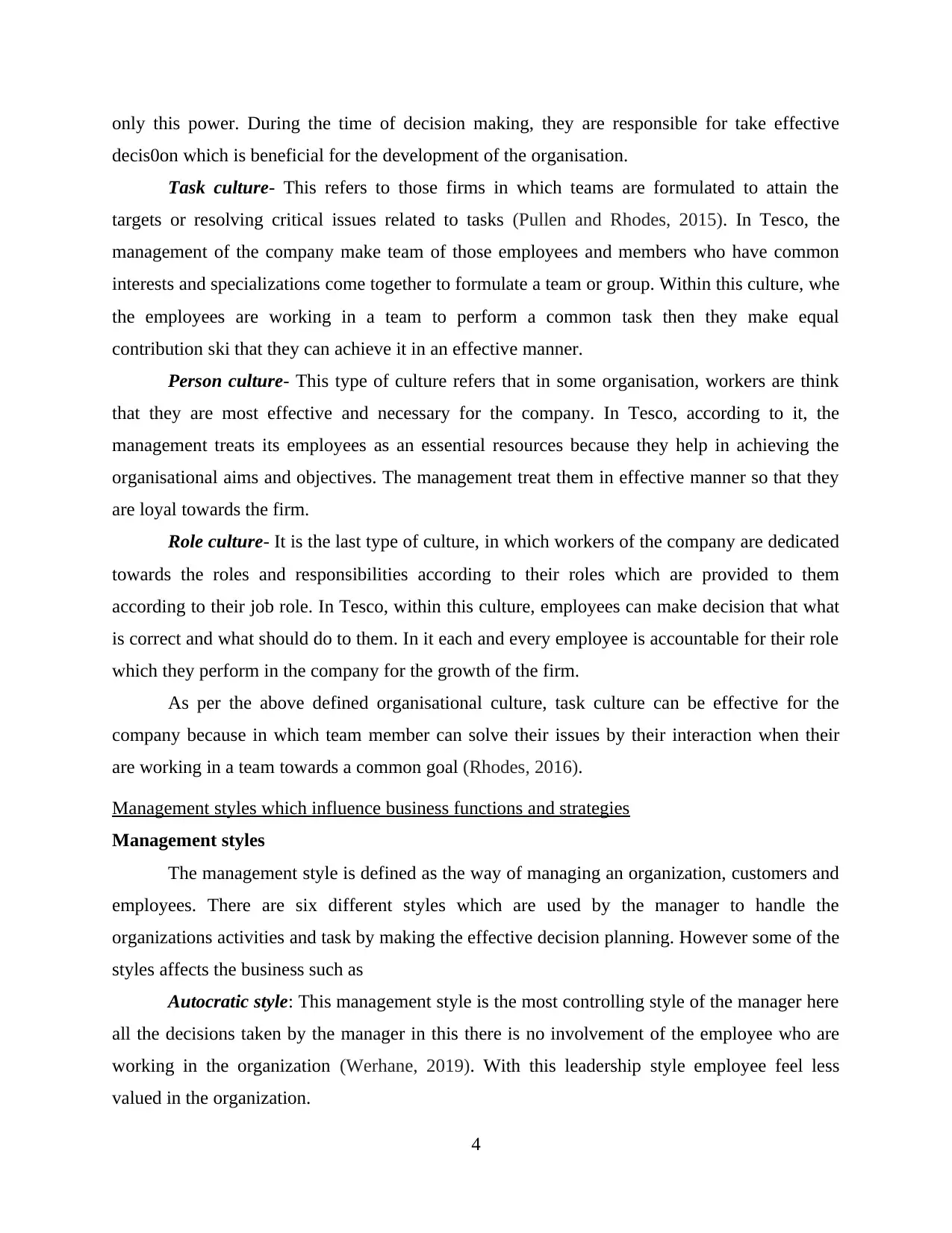
only this power. During the time of decision making, they are responsible for take effective
decis0on which is beneficial for the development of the organisation.
Task culture- This refers to those firms in which teams are formulated to attain the
targets or resolving critical issues related to tasks (Pullen and Rhodes, 2015). In Tesco, the
management of the company make team of those employees and members who have common
interests and specializations come together to formulate a team or group. Within this culture, whe
the employees are working in a team to perform a common task then they make equal
contribution ski that they can achieve it in an effective manner.
Person culture- This type of culture refers that in some organisation, workers are think
that they are most effective and necessary for the company. In Tesco, according to it, the
management treats its employees as an essential resources because they help in achieving the
organisational aims and objectives. The management treat them in effective manner so that they
are loyal towards the firm.
Role culture- It is the last type of culture, in which workers of the company are dedicated
towards the roles and responsibilities according to their roles which are provided to them
according to their job role. In Tesco, within this culture, employees can make decision that what
is correct and what should do to them. In it each and every employee is accountable for their role
which they perform in the company for the growth of the firm.
As per the above defined organisational culture, task culture can be effective for the
company because in which team member can solve their issues by their interaction when their
are working in a team towards a common goal (Rhodes, 2016).
Management styles which influence business functions and strategies
Management styles
The management style is defined as the way of managing an organization, customers and
employees. There are six different styles which are used by the manager to handle the
organizations activities and task by making the effective decision planning. However some of the
styles affects the business such as
Autocratic style: This management style is the most controlling style of the manager here
all the decisions taken by the manager in this there is no involvement of the employee who are
working in the organization (Werhane, 2019). With this leadership style employee feel less
valued in the organization.
4
decis0on which is beneficial for the development of the organisation.
Task culture- This refers to those firms in which teams are formulated to attain the
targets or resolving critical issues related to tasks (Pullen and Rhodes, 2015). In Tesco, the
management of the company make team of those employees and members who have common
interests and specializations come together to formulate a team or group. Within this culture, whe
the employees are working in a team to perform a common task then they make equal
contribution ski that they can achieve it in an effective manner.
Person culture- This type of culture refers that in some organisation, workers are think
that they are most effective and necessary for the company. In Tesco, according to it, the
management treats its employees as an essential resources because they help in achieving the
organisational aims and objectives. The management treat them in effective manner so that they
are loyal towards the firm.
Role culture- It is the last type of culture, in which workers of the company are dedicated
towards the roles and responsibilities according to their roles which are provided to them
according to their job role. In Tesco, within this culture, employees can make decision that what
is correct and what should do to them. In it each and every employee is accountable for their role
which they perform in the company for the growth of the firm.
As per the above defined organisational culture, task culture can be effective for the
company because in which team member can solve their issues by their interaction when their
are working in a team towards a common goal (Rhodes, 2016).
Management styles which influence business functions and strategies
Management styles
The management style is defined as the way of managing an organization, customers and
employees. There are six different styles which are used by the manager to handle the
organizations activities and task by making the effective decision planning. However some of the
styles affects the business such as
Autocratic style: This management style is the most controlling style of the manager here
all the decisions taken by the manager in this there is no involvement of the employee who are
working in the organization (Werhane, 2019). With this leadership style employee feel less
valued in the organization.
4
⊘ This is a preview!⊘
Do you want full access?
Subscribe today to unlock all pages.

Trusted by 1+ million students worldwide
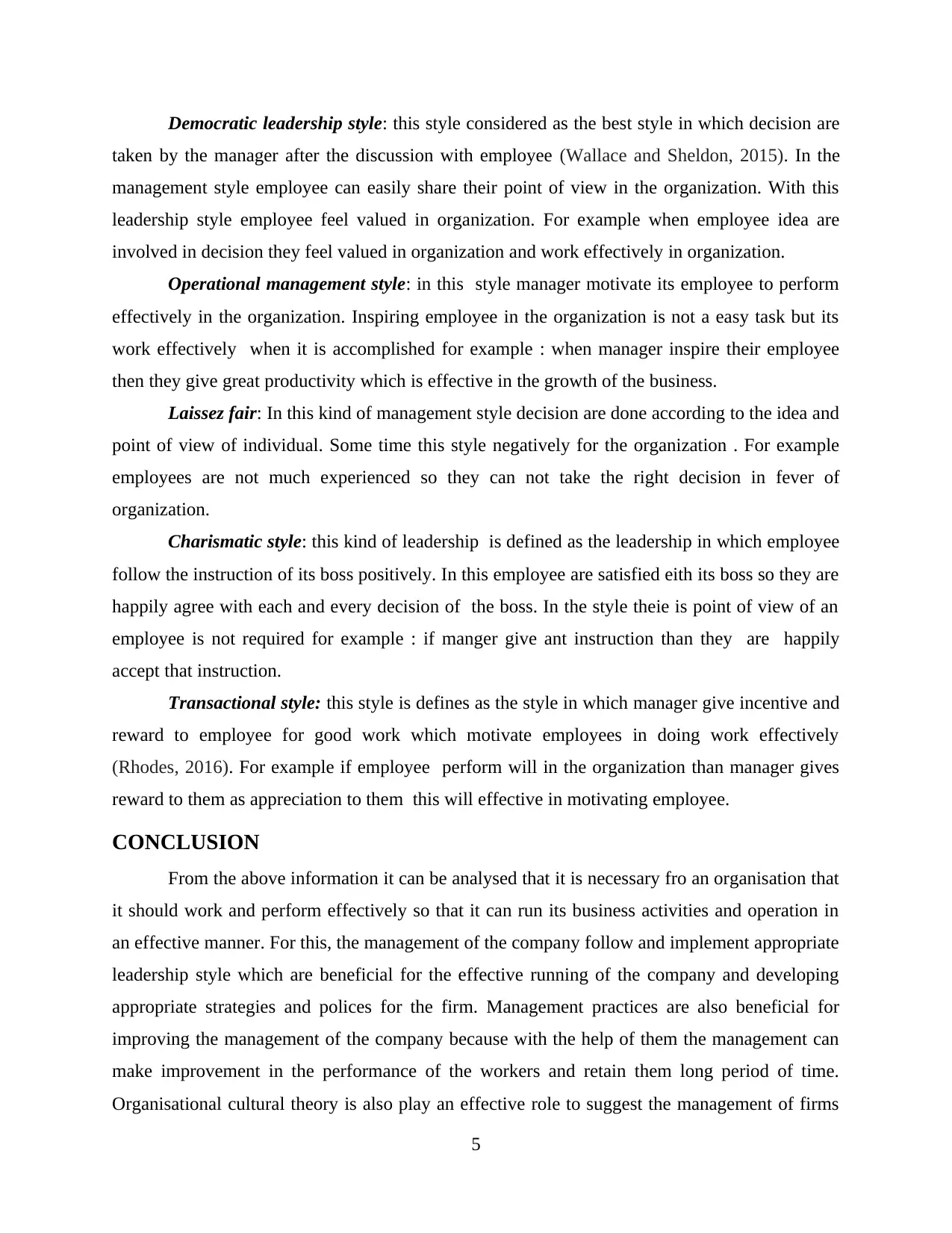
Democratic leadership style: this style considered as the best style in which decision are
taken by the manager after the discussion with employee (Wallace and Sheldon, 2015). In the
management style employee can easily share their point of view in the organization. With this
leadership style employee feel valued in organization. For example when employee idea are
involved in decision they feel valued in organization and work effectively in organization.
Operational management style: in this style manager motivate its employee to perform
effectively in the organization. Inspiring employee in the organization is not a easy task but its
work effectively when it is accomplished for example : when manager inspire their employee
then they give great productivity which is effective in the growth of the business.
Laissez fair: In this kind of management style decision are done according to the idea and
point of view of individual. Some time this style negatively for the organization . For example
employees are not much experienced so they can not take the right decision in fever of
organization.
Charismatic style: this kind of leadership is defined as the leadership in which employee
follow the instruction of its boss positively. In this employee are satisfied eith its boss so they are
happily agree with each and every decision of the boss. In the style theie is point of view of an
employee is not required for example : if manger give ant instruction than they are happily
accept that instruction.
Transactional style: this style is defines as the style in which manager give incentive and
reward to employee for good work which motivate employees in doing work effectively
(Rhodes, 2016). For example if employee perform will in the organization than manager gives
reward to them as appreciation to them this will effective in motivating employee.
CONCLUSION
From the above information it can be analysed that it is necessary fro an organisation that
it should work and perform effectively so that it can run its business activities and operation in
an effective manner. For this, the management of the company follow and implement appropriate
leadership style which are beneficial for the effective running of the company and developing
appropriate strategies and polices for the firm. Management practices are also beneficial for
improving the management of the company because with the help of them the management can
make improvement in the performance of the workers and retain them long period of time.
Organisational cultural theory is also play an effective role to suggest the management of firms
5
taken by the manager after the discussion with employee (Wallace and Sheldon, 2015). In the
management style employee can easily share their point of view in the organization. With this
leadership style employee feel valued in organization. For example when employee idea are
involved in decision they feel valued in organization and work effectively in organization.
Operational management style: in this style manager motivate its employee to perform
effectively in the organization. Inspiring employee in the organization is not a easy task but its
work effectively when it is accomplished for example : when manager inspire their employee
then they give great productivity which is effective in the growth of the business.
Laissez fair: In this kind of management style decision are done according to the idea and
point of view of individual. Some time this style negatively for the organization . For example
employees are not much experienced so they can not take the right decision in fever of
organization.
Charismatic style: this kind of leadership is defined as the leadership in which employee
follow the instruction of its boss positively. In this employee are satisfied eith its boss so they are
happily agree with each and every decision of the boss. In the style theie is point of view of an
employee is not required for example : if manger give ant instruction than they are happily
accept that instruction.
Transactional style: this style is defines as the style in which manager give incentive and
reward to employee for good work which motivate employees in doing work effectively
(Rhodes, 2016). For example if employee perform will in the organization than manager gives
reward to them as appreciation to them this will effective in motivating employee.
CONCLUSION
From the above information it can be analysed that it is necessary fro an organisation that
it should work and perform effectively so that it can run its business activities and operation in
an effective manner. For this, the management of the company follow and implement appropriate
leadership style which are beneficial for the effective running of the company and developing
appropriate strategies and polices for the firm. Management practices are also beneficial for
improving the management of the company because with the help of them the management can
make improvement in the performance of the workers and retain them long period of time.
Organisational cultural theory is also play an effective role to suggest the management of firms
5
Paraphrase This Document
Need a fresh take? Get an instant paraphrase of this document with our AI Paraphraser
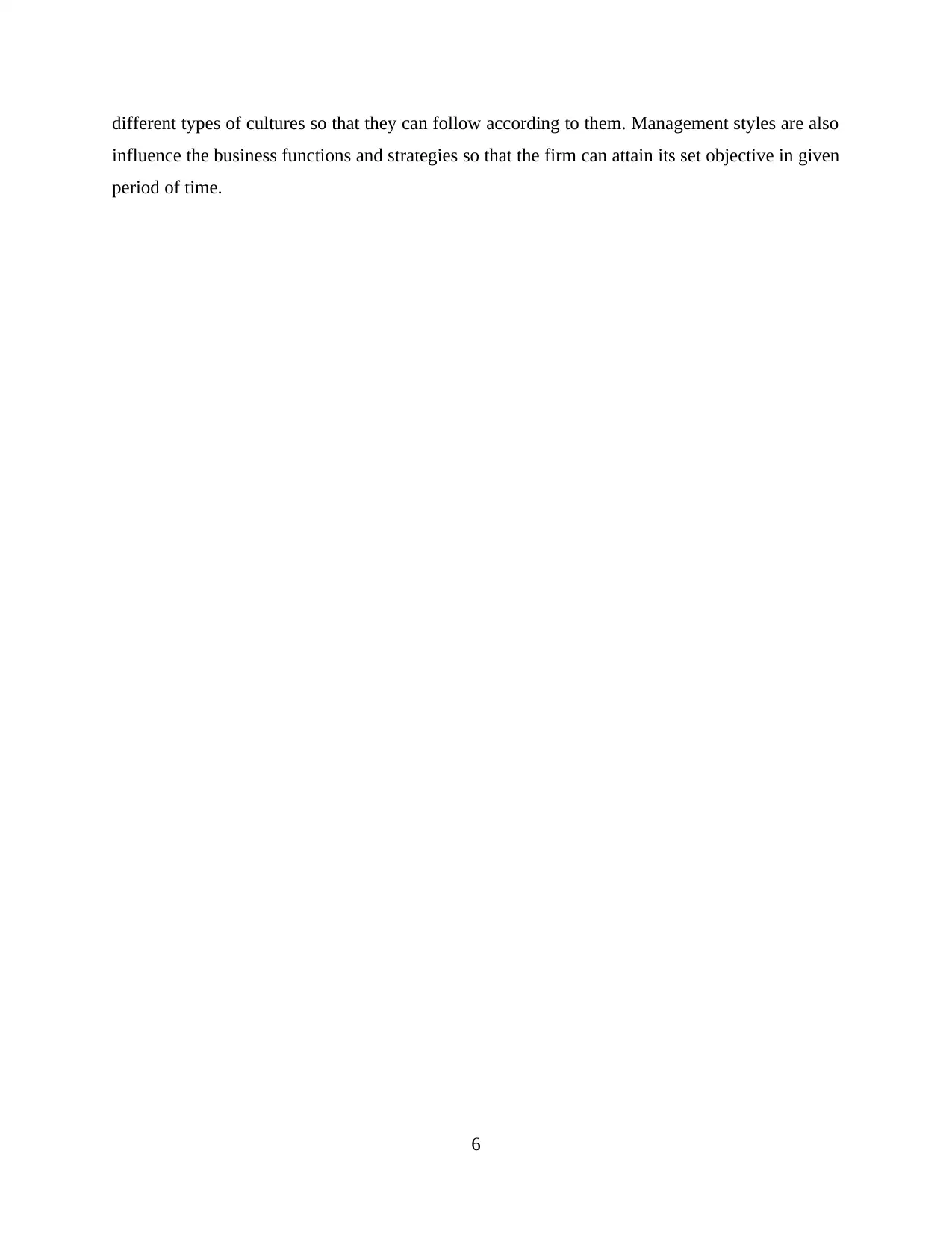
different types of cultures so that they can follow according to them. Management styles are also
influence the business functions and strategies so that the firm can attain its set objective in given
period of time.
6
influence the business functions and strategies so that the firm can attain its set objective in given
period of time.
6
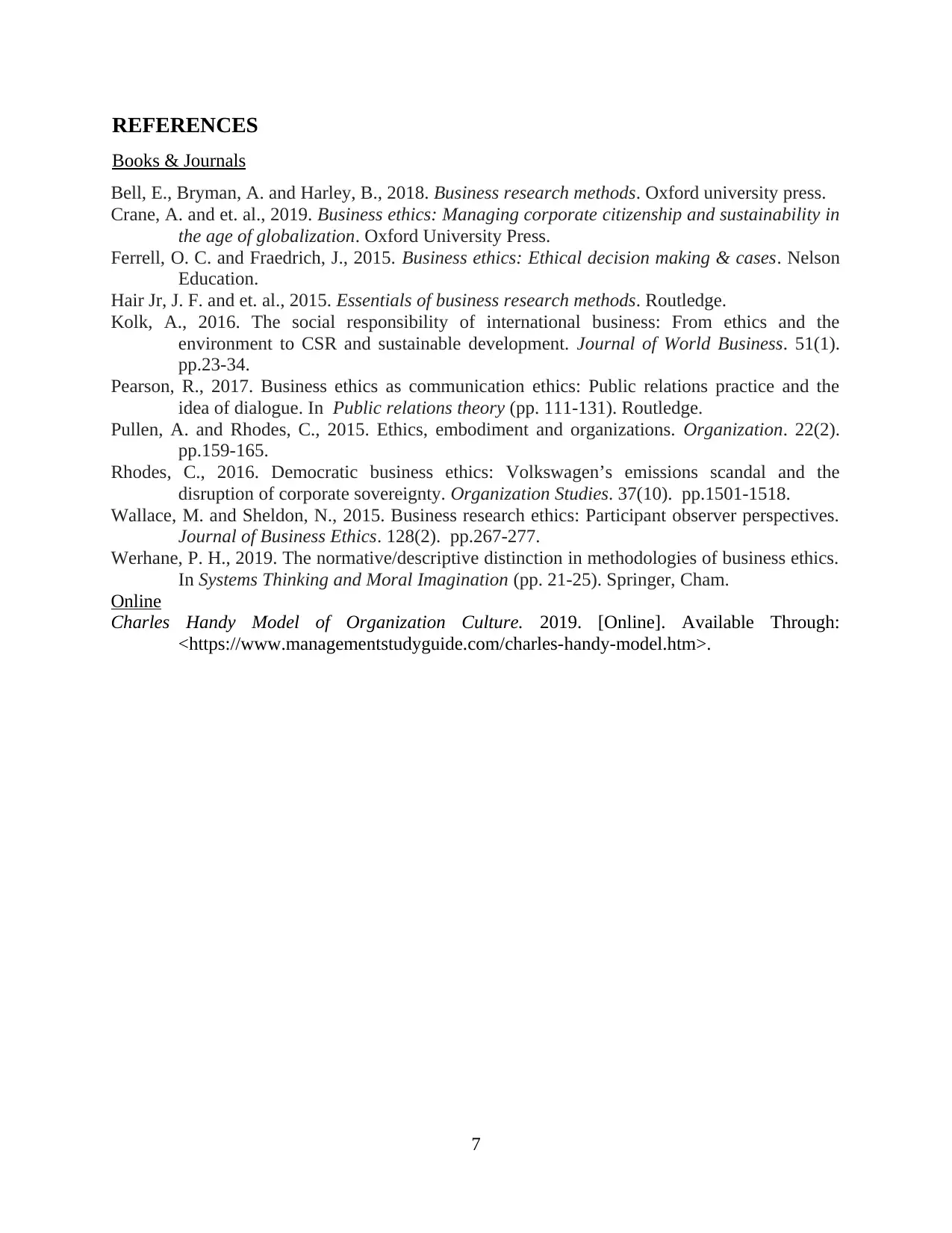
REFERENCES
Books & Journals
Bell, E., Bryman, A. and Harley, B., 2018. Business research methods. Oxford university press.
Crane, A. and et. al., 2019. Business ethics: Managing corporate citizenship and sustainability in
the age of globalization. Oxford University Press.
Ferrell, O. C. and Fraedrich, J., 2015. Business ethics: Ethical decision making & cases. Nelson
Education.
Hair Jr, J. F. and et. al., 2015. Essentials of business research methods. Routledge.
Kolk, A., 2016. The social responsibility of international business: From ethics and the
environment to CSR and sustainable development. Journal of World Business. 51(1).
pp.23-34.
Pearson, R., 2017. Business ethics as communication ethics: Public relations practice and the
idea of dialogue. In Public relations theory (pp. 111-131). Routledge.
Pullen, A. and Rhodes, C., 2015. Ethics, embodiment and organizations. Organization. 22(2).
pp.159-165.
Rhodes, C., 2016. Democratic business ethics: Volkswagen’s emissions scandal and the
disruption of corporate sovereignty. Organization Studies. 37(10). pp.1501-1518.
Wallace, M. and Sheldon, N., 2015. Business research ethics: Participant observer perspectives.
Journal of Business Ethics. 128(2). pp.267-277.
Werhane, P. H., 2019. The normative/descriptive distinction in methodologies of business ethics.
In Systems Thinking and Moral Imagination (pp. 21-25). Springer, Cham.
Online
Charles Handy Model of Organization Culture. 2019. [Online]. Available Through:
<https://www.managementstudyguide.com/charles-handy-model.htm>.
7
Books & Journals
Bell, E., Bryman, A. and Harley, B., 2018. Business research methods. Oxford university press.
Crane, A. and et. al., 2019. Business ethics: Managing corporate citizenship and sustainability in
the age of globalization. Oxford University Press.
Ferrell, O. C. and Fraedrich, J., 2015. Business ethics: Ethical decision making & cases. Nelson
Education.
Hair Jr, J. F. and et. al., 2015. Essentials of business research methods. Routledge.
Kolk, A., 2016. The social responsibility of international business: From ethics and the
environment to CSR and sustainable development. Journal of World Business. 51(1).
pp.23-34.
Pearson, R., 2017. Business ethics as communication ethics: Public relations practice and the
idea of dialogue. In Public relations theory (pp. 111-131). Routledge.
Pullen, A. and Rhodes, C., 2015. Ethics, embodiment and organizations. Organization. 22(2).
pp.159-165.
Rhodes, C., 2016. Democratic business ethics: Volkswagen’s emissions scandal and the
disruption of corporate sovereignty. Organization Studies. 37(10). pp.1501-1518.
Wallace, M. and Sheldon, N., 2015. Business research ethics: Participant observer perspectives.
Journal of Business Ethics. 128(2). pp.267-277.
Werhane, P. H., 2019. The normative/descriptive distinction in methodologies of business ethics.
In Systems Thinking and Moral Imagination (pp. 21-25). Springer, Cham.
Online
Charles Handy Model of Organization Culture. 2019. [Online]. Available Through:
<https://www.managementstudyguide.com/charles-handy-model.htm>.
7
⊘ This is a preview!⊘
Do you want full access?
Subscribe today to unlock all pages.

Trusted by 1+ million students worldwide
1 out of 9
Related Documents
Your All-in-One AI-Powered Toolkit for Academic Success.
+13062052269
info@desklib.com
Available 24*7 on WhatsApp / Email
![[object Object]](/_next/static/media/star-bottom.7253800d.svg)
Unlock your academic potential
Copyright © 2020–2026 A2Z Services. All Rights Reserved. Developed and managed by ZUCOL.




